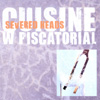Severed Heads, "Cuisine (with Piscatorial)"
 One of the main stumbling blocks that people have with Severed Heads' discography is that Tom Ellard's long, slow evolution from harsh tape loop experimentalism to hooky electronic pop has resulted in a lot of albums that are either too outré for people looking for "pop" or too straightforward and comparatively toothless for fans that loved his early works like Since the Accident.  The precise point at which those two sides of Ellard's vision struck the perfect balance is highly debatable, but I have always believed 1991's Cuisine to be the Sevs' definitive synthesis of edginess, unpredictability, and tight songcraft.
One of the main stumbling blocks that people have with Severed Heads' discography is that Tom Ellard's long, slow evolution from harsh tape loop experimentalism to hooky electronic pop has resulted in a lot of albums that are either too outré for people looking for "pop" or too straightforward and comparatively toothless for fans that loved his early works like Since the Accident.  The precise point at which those two sides of Ellard's vision struck the perfect balance is highly debatable, but I have always believed 1991's Cuisine to be the Sevs' definitive synthesis of edginess, unpredictability, and tight songcraft.
Volition/Nettwerk/Sevcom
As with most Severed Heads releases, Cuisine has cycled through a few different record labels and track lists, but most of the important things have remained relatively constant.  However, the appended Piscatorial EP was regrettably absent from the original cassette version.  That is unfortunate, as its inclusion is essential to the album's overall charm, concluding the skewed, beat-driven songs of the main album with a plunge into a rabbit hole of deep weirdness.
Central to Cuisine's appeal is the simple fact that Ellard wrote a handful of brief, punchy, and sometimes quite excellent "pop" songs, but was still quite happy to derail them with anachronistic or mischievous surprises. It is a combination that works quite well. Naturally, given that this electronic music was made using the technology of 20 years ago, some of the beats and synth parts sound rather dated at times, but several of the songs are solid enough to transcend that: for example, the stripped-down and spectral "Ugly Twenties" still sounds as vital as ever today.  Weirdly, it is probably the most straightforward song on the album, making it an unexpected favorite for me.  Many of the similarly melodic and propulsive songs on the album are far more traditionally "Severed Heads," such as the cut-up, pitch-shifted voices in "Pilot in Hell," or the "out-of-control bagpipe ensemble" and "malfunctioning film projector" sounds in "Goodbye." Such distinctly Ellard-ian touches also serve to elevate the pieces where the songwriting isn't as strong, like the striking fiddle loop interlude in "Golden Height/I'm Your Antidote" or the haunting singing sample in "The Tingler."  Those touches are why I love this album–even its clunkiest and clumsiest moments might be interrupted by something totally unexpected or sublimely beautiful.
Piscatorial is the icing on the cake (for me anyway), though it probably seems like a perverse endurance test for those drawn to Severed Heads' catchier side, as it evinces an incredible zeal for endless repetition with slow and subtle variation.  Fortunately, anyone who can make it through the relentlessly insistent children's song-sampling piece "Kangaroo Skippy Roo" or the obsessively looping phase-shift experiment of "Quest for Oom Pa Pa" is treated to one of the greatest pieces that Ellard ever recorded: "Wonder of all the World."  Oddly, it sticks to the tireless repetition and heavy reliance on loops that characterized its predecessors, but keeps things extremely focused and minimal.  In fact, there are only two conspicuous parts: a melancholy string snippet appropriated from a classical piece and the sung phrase "wonder of all the world."  The magic lies in what Ellard does with those simple materials, as he warps and slows down the vocalist in supremely unsettling and ghostly fashion.
Sadly, I haven't met too many other people that share my excitement about this album, which I can understand, as it is somewhat self-indulgent, inconsistent, and very much rooted in a very specific era that has passed.  Nevertheless, it is still packed full of infectious hooks and great ideas and boasts at least two rather brilliant songs.  Equally importantly, it is entirely devoid of the clichés and posturing that were so rampant in "industrial" music around that time.  I am particularly impressed with how Ellard used loops on this album, as he never did anything obvious like lift a beat, bassline, movie dialog sample, or recognizable hook. Instead, he managed to craft some rather soulful, stuttering hooks of his own through enthusiastic mutilation and reshaping of improbable or unrecognizable source material.  Consequently, no one else sounded quite like this (then or now).  Taken in its entirely, Cuisine certainly has a number of flaws, but it is definitely original and ingenious enough to warrant a re-evaluation.
 




